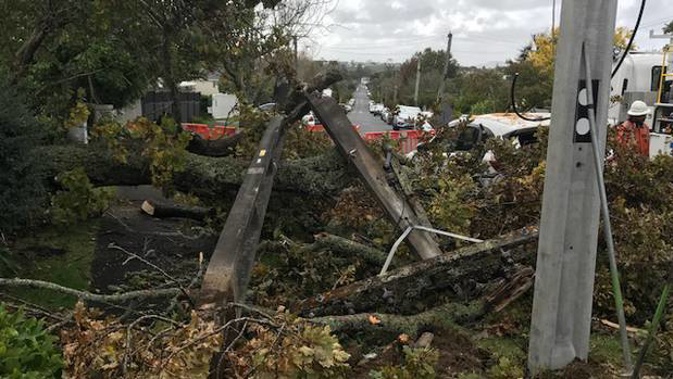
Ageing, rotting and rusting power poles on private urban and rural properties are dangerous and the risk of people being electrocuted or hit by falling poles is growing every year, electricity distributors are warning.
The Electricity Networks Association (ENA), the voice of 27 New Zealand electricity distributors such as Auckland's Vector, Powerco and WEL Networks, said that in cities and on farms much of the infrastructure carrying electricity from the road power connection to houses, buildings and dairy sheds is getting old and in "a bad state".
The infrastructure causing alarm includes aged power poles, crossbars, insulators and rusting metal fittings.
"These assets are dangerous," said ENA chief executive Graeme Peters.
The problem has become acute because of lack of maintenance and repair by property owners who don't realise that by law, and as interpreted by the Commerce Commission, it's their responsibility to maintain, repair and keep trees away from poles and lines on their land, he said.
Then there are the householders and farmers who do know but don't want to pay for the upkeep or repairs or don't have the money to do so. And where there are several properties down a right-of-way, a common residential situation in Auckland, multiple owners may not be able to agree on cost responsibility so nothing gets done, Peters said.
Recent severe storms have highlighted the deteriorating state of the private property infrastructure when trees have toppled failing poles and lines.
Vector, the country's biggest electricity distributor, said the issue contributed to its heavy workload and delays in restoring power after this month's storm damage across Auckland.
"We're really concerned there is going to be a bad accident. Someone is going to be electrocuted, someone is going to get killed," said Peters. "We're particularly concerned about children."
"We did a study on this and found that from 2025 on a lot of private land the condition is going to get substantially worse. They'll be hitting 40 to 50 years old and that's when they need to be replaced. We're going to see a lot more line failings and that raises the risk of people getting hurt, by being electrocuted or by poles falling on them."
After a natural disaster, distributors have told the Herald they feel a social responsibility to help property owners restore power but the way the law stands they can't recover their costs.
In 2012 a report to ENA by consultants Energia on the management of service lines estimated the problem of pole failure rates to be 10 times greater than what was considered reasonable.
"The size of the problem is large with the cost to replace "at risk" service lines over the next 12 years estimated at $370 million, with maintenance estimated to be a further $230 million," Energia said six years ago.
A bid by the ENA two years ago to find a solution with the Commerce Commission was rejected.
The ENA proposed that the cost of maintaining customer service lines be treated as a regulated cost under the Commerce Act so distributors could maintain customer service lines and recover their costs.
The ENZ raised the issue again with the commission early last year, challenging its opinion.
The commission in a statement to the Herald said: "The commission does not set Government policy. While in our view the legislation is clear, we appreciate that in practice, determining the exact point of supply can be difficult".
But the commission expected electricity lines companies to ensure connections to their networks were safe. They were responsible for communicating with landowners to ensure they understood their obligations to maintain their lines.
Peters said ENA has been "diligent" about red-flagging the issue for years. It had recently held discussions with relevant authorities, including WorkSafe, the Ministry of Business, Innovation and Employment (MBIE) and the commission.
"We've been explaining to them the risk to public safety, explaining the legislation is confusing, explaining the lack of (public) awareness and explaining that if we were to go and work on these lines, we can't recover the costs."
Vector had spent "tens of millions" maintaining private land poles and lines when it saw a safety risk, said chief network officer Andre Botha.
Servicing them alone had cost Vector $38m in the past four financial years.
An MBIE spokesman said the ministry "is aware of the issue, is investigating it and will be providing advice to the Minister (of Commerce) once it has a better understanding of the scale of the problem and potential solutions.
"It's basically a problem with the law," said Peters.
"We'd like more flexibility to interpret the law. We'd like the ability to fix these lines but at the moment we can't recover the cost. That means other consumers have to pay a cross-subsidy.
"We're at a landing point now where basically the distribution companies have the responsibility to this thing called 'point of supply' which is mainly on the boundary of a property.
"For example a house with a power pole on the property that would be point of supply. It gets more complex, especially in Auckland where you've got three houses down a right-of-way. Where is the point of supply? Is it the power pole or where it enters private land? The line might travel the privately-owned shared right-of-way. That's confusing and open to interpretation."
Peters said if a tree comes down on a consumer service line a network might come and fix it but would charge for the service.
"That leads to issues."
Take your Radio, Podcasts and Music with you









